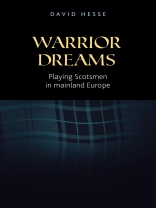Why does a Parisian banker re-enact the medieval wars of Wallace and Bruce in his spare time? Why do more than 20, 000 people attend the Schotse Weekend bagpipe competition in Bilzen, Flanders? Why does an entire village in the Italian Alps celebrate a lost Scottish regiment? And why is there a Highland Games circuit of at least 30 kilted strength competitions in Austria, with dedicated athletes tossing hay-balls and pulling tractors?
This is the first study of the self-professed ‘Scots’ of Europe. It follows the many thousands of Europeans who are determined to discover their inner Scotsman, and argues that by imitating the Scots of popular imagination, the self-styled European Highlanders hope to reconnect with their own ancestors – their lost songs, traditions and tribes. They approach Scotland as a site of European memory.
This book explores issues of performance and celebration, memory and nostalgia, heritage and identity, and will be of interest to specialists on Scottish emigration and diaspora, Scottish history and myth, and to the ‘Scots’ of Europe themselves.
สารบัญ
Introduction: The Scots of Europe
1. Context: playing the past
2. The Scottish dreamscape: formation
3. The Scottish dreamscape: spread
4. Marching Scots: pipe bands
5. Only the strong: Highland Games
6. Our Scottish past: commemorations
7. Régiments du passé: re- enactment
8. Homecomings: finding neverland
9. Who’s like us? Scotland as a site of memory
Conclusion: Warrior dreams
Appendix A: Tables
Appendix B: Sample questionnaire
Bibliography
Index
เกี่ยวกับผู้แต่ง
David Hesse holds a Ph D from the University of Edinburgh and now works as a political correspondent for a Swiss daily newspaper in Washington D.C.












